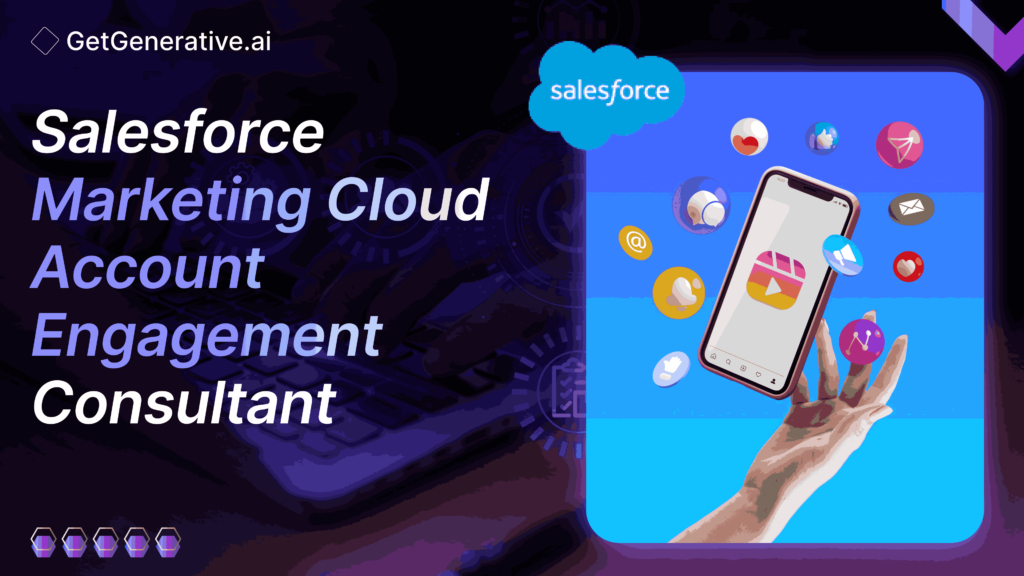Salesforce Marketing Cloud Account Engagement Consultant
Salesforce Marketing Cloud Account Engagement, formerly Pardot, has emerged as a leading platform for B2B marketing automation. According to recent statistics, companies using marketing automation software generate up to 451% more qualified leads than those not leveraging such tools.
Additionally, 77% of CMOs at top-performing companies indicate that their most compelling reason for implementing marketing automation is to increase revenue.
What is a Salesforce Marketing Cloud Account Engagement Consultant?
A Salesforce Marketing Cloud Account Engagement Consultant is a specialized professional who helps businesses maximize their use of the Salesforce Marketing Cloud platform, particularly focusing on the Account Engagement (Pardot) module. These consultants possess in-depth knowledge of B2B marketing strategies, marketing automation, and the Salesforce ecosystem.
How do you become a Salesforce Marketing Cloud Account Engagement Consultant?
To become a Salesforce Marketing Cloud Account Engagement Consultant, one should:
- Gain a strong foundation in marketing principles and B2B strategies
- Learn Salesforce CRM basics
- Study and practice with Salesforce Marketing Cloud Account Engagement (Pardot)
- Obtain relevant Salesforce certifications
- Gain practical experience through internships or entry-level positions
- Stay updated with the latest marketing trends and Salesforce updates
What are the responsibilities of a Salesforce Marketing Cloud Account Engagement Consultant?
Salesforce Marketing Cloud Account Engagement Consultants have many responsibilities requiring technical expertise and strategic thinking. Here’s a more detailed look at their key duties:
Strategy Development and Implementation:
- Conduct in-depth analysis of client’s current marketing processes and goals
- Develop comprehensive marketing automation strategies aligned with business objectives
- Create roadmaps for implementation and optimization of Pardot
Pardot Configuration and Customization:
- Set up and configure Pardot instances to meet specific client needs
- Customize fields, page layouts, and automation rules
- Implement and manage connector settings for seamless integration with Salesforce CRM
Campaign Creation and Management:
- Design and execute multi-channel marketing campaigns using Pardot’s tools
- Create and manage email templates, landing pages, and forms
- Implement dynamic content and personalization strategies
- Set up drip campaigns and nurture tracks in Engagement Studio
Lead Management:
- Develop and implement lead scoring and grading models
- Create and manage lead assignment rules
- Set up lead nurturing workflows and automation rules
- Implement lead lifecycle stages and transitions
Reporting and Analytics:
- Set up custom dashboards and reports in Pardot and Salesforce
- Analyze campaign performance and provide actionable insights
- Monitor key performance indicators (KPIs) and suggest optimizations
- Conduct A/B tests and interpret results for continuous improvement
Integration and Data Management:
- Ensure proper syncing between Pardot and Salesforce CRM
- Manage data cleansing and deduplication processes
- Implement and manage third-party tool integrations (e.g., AdWords, social media platforms)
Also Read – Salesforce Marketing Cloud Consultant: A Complete Guide
Training and Support:
- Provide comprehensive training to client teams on Pardot usage and best practices
- Offer ongoing support and troubleshooting
- Create documentation and user guides for client reference
Compliance and Security:
- Ensure marketing activities comply with data protection regulations (e.g., GDPR, CCPA)
- Implement and manage proper data security measures
- Set up and maintain privacy and preference centers
Continuous Optimization:
- Stay updated with new Pardot features and updates
- Regularly audit and optimize existing campaigns and automations
- Propose and implement new strategies to improve marketing ROI
Collaboration and Communication:
- Work closely with sales teams to ensure alignment between marketing and sales processes
- Collaborate with other departments (IT, customer service) for holistic customer experience
- Present reports and recommendations to stakeholders and executives
Benefits of hiring a Salesforce Marketing Cloud Account Engagement Consultant
- Expertise in B2B marketing automation
- Improved lead generation and nurturing
- Enhanced alignment between marketing and sales teams
- Increased ROI on marketing efforts
- Customized strategies tailored to business needs
- Ongoing optimization and support
Also Read – Salesforce Marketing Cloud Implementation Guide
Advanced Strategies for Salesforce Marketing Cloud Account Engagement
Account-Based Marketing (ABM) Implementation:
- Use pardot’s account-based marketing features to target high-value accounts
- Create personalized content and campaigns for specific accounts or industries
- Implement account scoring to prioritize marketing efforts
- Utilize pardot’s Einstein Account-Based Marketing features for AI-driven insights
AI-Powered Personalization using Einstein AI:
- Leverage Einstein Content Selection to choose the best content for each recipient automatically
- Implement Einstein Send Time Optimization to determine the best time to send emails
- Use Einstein Behavior Scoring to identify the most engaged prospects
- Employ Einstein Campaign Insights to understand which campaign elements are most effective
Advanced Segmentation and Targeting:
- Utilize dynamic lists based on complex criteria and behaviors
- Implement progressive profiling to gather more data over time
- Use behavior tracking and custom redirects for detailed activity tracking
- Leverage pardot’s Engagement History to create highly targeted segments
Multi-Channel Campaign Orchestration:
- Design integrated campaigns across email, social media, ads, and website
- Use pardot’s Social Posting feature to coordinate social media efforts
- Implement cross-channel lead nurturing programs in the Engagement Studio
- Utilize pardot’s Connected Campaigns feature for seamless reporting across channels
Predictive Lead Scoring:
- Implement Einstein Lead Scoring for AI-driven lead prioritization
- Combine traditional lead scoring with AI predictions for a hybrid model
- Use predictive scores to trigger automated actions and personalize content
- Continuously refine scoring models based on closed-loop reporting
Dynamic Content Creation and Delivery:
- Utilize Pardot’s dynamic content feature in emails, landing pages, and forms
- Implement content personalization based on prospect data and behavior
- Use Salesforce CMS integration for centralized content management
- Leverage Pardot’s Snippets feature for easily updateable content across multiple assets
Advanced Automation and Workflow Optimization:
- Design complex, branching automation rules and Engagement Studio programs
- Implement parallel and nested automation for sophisticated lead journeys
- Use completion actions to create seamless handoffs between different automations
- Leverage Salesforce Flow integration for advanced cross-platform automations
Intent Data Integration:
- Integrate third-party intent data providers with Pardot
- Use intent signals to trigger timely, relevant communications
- Incorporate intent data into lead scoring and grading models
- Create targeted campaigns based on specific intent topics or categories
Advanced Analytics and Attribution:
- Implement multi-touch attribution models using Pardot and Salesforce Campaign Influence
- Utilize B2B Marketing Analytics for in-depth performance analysis
- Create custom funnel visualization reports to track lead progression
- Use Pardot’s native A/B testing capabilities for continuous optimization
Personalized Sales Enablement:
- Implement Pardot’s Sales Insight features for real-time prospect activity alerts
- Create automated task creation in Salesforce based on prospect behavior
- Develop customized content kits for sales teams based on prospect interactions
- Use Engagement History to provide sales with a full view of prospect interactions
These advanced strategies leverage the full power of Salesforce Marketing Cloud Account Engagement to create sophisticated, data-driven marketing campaigns that drive results and provide a personalized experience for prospects and customers.
Best practices for using Pardot for B2B marketing
- Develop a comprehensive lead nurturing strategy
- Implement proper lead scoring and grading
- Create engaging, personalized content
- Utilize automation rules and engagement studio programs
- Regularly clean and maintain your database
- Align sales and marketing teams through shared metrics and goals
How to optimize lead generation with Salesforce Marketing Cloud
- Implement progressive profiling on forms
- Use dynamic content to personalize user experiences
- Leverage social media advertising integration
- Implement A/B testing for landing pages and emails
- Utilize Pardot’s SEO tools for organic lead generation
- Implement lead nurturing campaigns based on buyer personas
Also Read – Becoming a Salesforce Consultant – The Ultimate Guide
What certifications are required for a Salesforce Marketing Cloud Account Engagement Consultant?
Key certifications include:
- Salesforce Certified Marketing Cloud Account Engagement Specialist
- Salesforce Certified Marketing Cloud Administrator
- Salesforce Certified Marketing Cloud Consultant
- Salesforce Certified Marketing Cloud Developer
Additional certifications that can be beneficial:
- Salesforce Certified Administrator
- Salesforce Certified Sales Cloud Consultant
What is the salary range for a Salesforce Marketing Cloud Account Engagement Consultant?
The salary range for Salesforce Marketing Cloud Account Engagement Consultants varies based on experience, location, and expertise. On average, salaries range from $70,000 to $150,000+ per year. Senior consultants or those with specialized skills can earn even more.
How does Salesforce Marketing Cloud integrate with other tools?
Salesforce Marketing Cloud Account Engagement integrates seamlessly with:
- Salesforce CRM (Sales Cloud, Service Cloud)
- Social media platforms (Facebook, Twitter, LinkedIn)
- Google Analytics and Google Ads
- Content Management Systems (CMS)
- Webinar platforms (Zoom, GoToWebinar)
- Third-party apps via Salesforce AppExchange
Conclusion
Salesforce Marketing Cloud Account Engagement Consultants play a crucial role in helping businesses leverage the power of marketing automation for B2B success. With their expertise in Pardot and B2B marketing strategies, these professionals can significantly impact lead generation, customer engagement, and revenue growth.
Enhance your Salesforce consulting with GetGenerative.ai. Effortlessly craft outstanding proposals, enabling you to dedicate more time to providing exceptional client service.
Start today!
Frequently Asked Questions (FAQs)
1. What’s the difference between Pardot and Marketing Cloud?
Pardot (now called Marketing Cloud Account Engagement) is specifically designed for B2B marketing, while Marketing Cloud covers both B2B and B2C marketing across various channels.
2. How long does becoming a Salesforce Marketing Cloud Account Engagement Consultant take?
Becoming proficient typically takes 1-3 years of dedicated learning and practical experience.
3. Can Pardot be used for B2C marketing?
While Pardot is optimized for B2B, it can be adapted for certain B2C use cases, especially for businesses with longer, considered purchase cycles.




